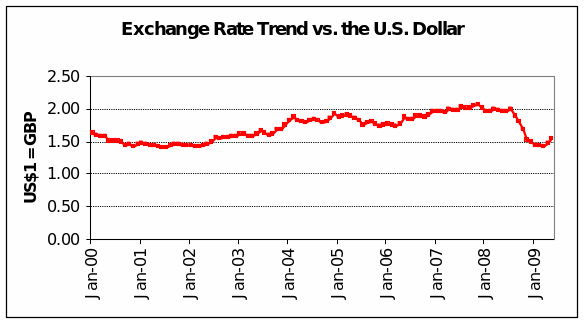Recent Economic Developments
Two phenomena that directly impact the hospitality industry are the ongoing recession and the recent appreciation against the U.S. dollar (Bank of England, 2009). Other harbingers of the current economic travails are tight credit and falling home prices (FSA, 2009; Central Intelligence Agency, 2009)
The country has not been spared the effects of the global economic slowdown that commenced with a recession across the Atlantic from December 2007. The economy shrank in the second half of 2008, two continuous quarters of negative gross national product growth confirming by official definition that the recession had washed ashore in the country. According to the Office of National Statistics, even that 1.5% quarterly contraction was the worst in 28 years (RTÉ Commercial Enterprises Limited, 2009). In February, the Financial Services Authority (2009) warned that the economy would shrink by at least 2.2% for the rest of the year and trouble in the banking sector suggested that this was a rosy forecast. The situation could get worse before it gets better. A recovery in 2010 is not certain.
In a recession, consumer spending falls faster than the contraction of GNP, exacerbated by layoffs and newfound pessimism about personal and household prospects in the months ahead. Even the supposedly cheery 1.5% rise in retail sales last Christmas turns out to have been nearly 3% below what the total holiday shopping recorded in December 2007.
Domestic economics affects the local hospitality industry because lodges and chain hotels are also dependent on domestic tourism.
With respect to inbound traffic, tourists from abroad, the exchange rate versus the U.S. dollar as the preferred global trading currency is relevant. After appreciating against that currency commencing in January 2004, the pound sterling depreciated again in July 2008 (see Figure 1 below), just as the current recession commenced. This has favourable implications for tourist traffic since foreigners who count value in American dollars are bound to find UK prices significantly cheaper than at this time last year.

Adapting the Hotel Chain Marketing Mix
Place, Product and Service Mix
Place and product mix are of a piece since hotel location is the distribution channel and “point of sale” for the hospitality business.
The combination of a shrinking economy and depreciating currency has distinct implications for the hotel categories that will remain sustainable and even gain market share during this recession. In general, budget hotel chains will see increased business from newly cost-conscious domestic tourists (MINTEL Oxygen, 2008). If the hotel chain in question belongs to this category, then it is poised to do at least as well as it used to in better times.
Advertising and Promotions Mix
Presuming the property is in the budget category, the A & P goal is to gain share from both the pricier chains and others in its class. This means more impactful creative materials, seeking to own the “short break” space that locals add to their annual two-week foreign vacation, greater media weight, and a media mix with targeted “rifling” towards budget-conscious audiences.
Bibliography
Bank of England (2009) Monetary & Financial Statistics. Web.
Central Intelligence Agency (2009) The world factbook. Web.
Financial Services Authority (2009) UK’s FSA warns recession may exceed forecasts. as quoted by RTÉ Business. Web.
RTÉ Commercial Enterprises Limited (2009) British economy officially in recession. Web.